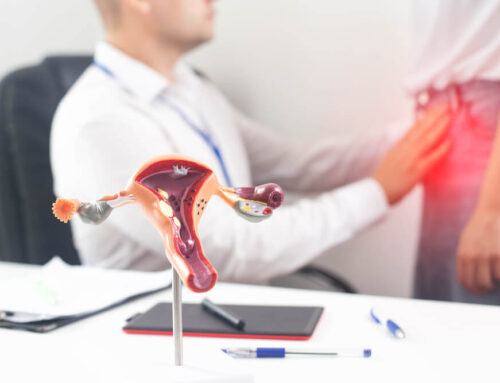Dyspareunia, commonly known as painful intercourse, can significantly impact one’s quality of life. This condition, often misunderstood, warrants a closer look at what causes pain during sex in females, symptoms, and available dyspareunia treatments to empower those affected.
When experiencing this type of pain, or painful sex in general, you have to consult with a medical professional. This said, choosing the most suitable option for your particular needs is critical. Healthcare centers such as the Women’s Health Partners employ the best experts in the field of reproductive health, so you can rely on their help and support and share with them anything that might worry you. Dyspareunia is not a joke, so make sure you schedule a timely consultation.
What is Dyspareunia?
Dyspareunia is a medical term that describes the persistent pain experienced during sexual intercourse. This condition, affecting both men and women, is characterized by discomfort that can range from mild to severe, creating a significant impact on individuals’ overall well-being. While it can be a complex issue with a variety of potential causes, dyspareunia is often more prevalent in females.
The pain associated with painful sex may occur at different stages of sexual activity, including penetration, thrusting, or even persisting after intercourse. Understanding the underlying factors, both physical and psychological, is crucial in addressing and managing dyspareunia effectively, allowing individuals to restore their sexual health and enhance their overall quality of life.
What Causes Pain During Sex?
Understanding what causes pain during sex in females is crucial for effective management. Various factors contribute to dyspareunia, and they can be both physical and psychological.
Here are some of the most common causes of painful intercourse:
- Infections and Inflammation: Infections of the reproductive organs, such as yeast infections or pelvic inflammatory disease, can lead to painful intercourse.
- Vaginal Dryness: Insufficient lubrication can cause friction during sex, resulting in discomfort. This is commonly associated with hormonal changes, especially during menopause.
- Structural Issues: Conditions like uterine fibroids, endometriosis, or ovarian cysts can contribute to pain during intercourse.
- Pelvic Floor Disorders: Dysfunction in the muscles of the pelvic floor may lead to painful sex. These issues can arise due to childbirth, trauma, or surgery.
- Emotional Factors: Stress, anxiety, depression, or a history of sexual trauma can contribute to dyspareunia. Emotional well-being is closely tied to sexual health.
- Relationship Issues: Strained relationships or communication problems with a partner can manifest as physical discomfort during sex.
Symptoms of Dyspareunia
Dyspareunia can manifest through various symptoms, which may vary in intensity and duration. Common symptoms include:
- Sharp or Burning Pain: Sharp or burning pain during intercourse is a distinctive symptom of dyspareunia, signaling discomfort that can be felt during penetration or thrusting. This sensation, akin to a stabbing or scalding feeling, often arises from factors such as infections, inflammation, or issues with lubrication.
- Aching Pain: Persistent aching or soreness that lingers after sexual activity.
- Superficial Pain: Pain located near the entrance of the vagina, often associated with initial penetration.
- Deep Pain: Discomfort in the pelvic region during deep penetration, suggesting potential issues with internal structures.
- Throbbing Pain: Pulsating pain that persists after intercourse, possibly indicating underlying issues.
- Muscle Spasms: Involuntary contractions of pelvic floor muscles, contributing to pain during or after sex.
- Tenderness: Increased sensitivity and tenderness in the genital area, making sexual activity uncomfortable.
- Burning Sensation: A sensation of heat or burning, often related to inflammation or infection.
- Dryness: Insufficient vaginal lubrication, leading to friction and discomfort during penetration.
- Discomfort with Specific Movements: Pain associated with certain sexual positions or movements, indicating potential structural issues.
It is crucial for individuals experiencing these symptoms to consult with healthcare professionals to identify the underlying causes and explore appropriate treatment options tailored to their specific condition.
Dyspareunia in Females: What Causes Pain During Sex in Females?
For females, dyspareunia can be particularly distressing. Understanding the specific causes during sex in females is vital for tailored treatment:
- Vaginal infections are a common factor contributing to dyspareunia, manifesting as discomfort and pain during sexual intercourse. Conditions such as yeast infections or bacterial vaginosis can cause irritation, inflammation, and an increased sensitivity of the vaginal tissues. Effective management of dyspareunia associated with vaginal infections often involves treating the underlying infection with medications like antifungals or antibiotics, coupled with measures to promote vaginal health and balance.
- Menopause plays a significant role in the development of dyspareunia, contributing to painful intercourse in many women. The hormonal changes associated with menopause lead to a decrease in estrogen levels, resulting in vaginal dryness, thinning of the vaginal walls, and a heightened susceptibility to irritation during sex. Addressing dyspareunia related to menopause often involves hormone replacement therapy (HRT), moisturizers, or lubricants to alleviate vaginal dryness and enhance overall sexual comfort.
- Endometriosis is a condition where tissue similar to the lining of the uterus grows outside the uterus, frequently causing dyspareunia. During intercourse, the displacement of this abnormal tissue can lead to deep pelvic pain and discomfort. Managing dyspareunia associated with endometriosis often involves a multidisciplinary approach, including pain management strategies, hormonal treatments, or, in severe cases, surgical intervention to remove the displaced tissue.
- Pelvic Inflammatory Disease (PID) is an infection affecting the female reproductive organs, commonly contributing to dyspareunia. In PID, the inflammation of the pelvic organs, such as the uterus, fallopian tubes, or ovaries, can result in pain during sexual intercourse. Prompt diagnosis and treatment of the underlying infection with antibiotics are crucial in managing dyspareunia associated with PID, preventing potential complications and promoting overall reproductive health.
Dyspareunia Treatment
Dyspareunia treatment aims to address the underlying causes of painful intercourse, focusing on both physical and psychological aspects to enhance overall sexual well-being. Medical interventions play a crucial role, and the approach varies depending on the identified factors contributing to dyspareunia. In cases where infections are the culprit, such as yeast infections or bacterial vaginosis, targeted antimicrobial treatments like antibiotics or antifungals may be prescribed.
For hormonal imbalances, especially common during menopause, hormone replacement therapy (HRT) can help alleviate symptoms like vaginal dryness and thinning of the vaginal walls. Surgical procedures may be considered for structural issues such as endometriosis, fibroids, or ovarian cysts, providing a more permanent solution to alleviate pain during intercourse.
Beyond medical interventions, pelvic floor physical therapy is often recommended. This involves exercises to strengthen and relax the pelvic floor muscles, addressing issues like muscle spasms and tension contributing to dyspareunia.
Additionally, counseling and psychotherapy are valuable components of treatment, especially when emotional factors or relationship issues are identified as contributors to painful intercourse. Open communication, emotional support, and strategies to reduce anxiety and stress can significantly improve the overall effectiveness of dyspareunia treatment, empowering individuals to reclaim a fulfilling and pain-free intimate life.
Conclusion
Dyspareunia, though challenging, is a treatable condition. Identifying its causes, recognizing symptoms, and seeking appropriate treatment can significantly improve sexual well-being. Whether physical or psychological, addressing the root of the issue is essential for a fulfilling and pain-free intimate life.
If you or your partner are experiencing painful intercourse, consult with a healthcare professional to explore personalized solutions for a healthier and more satisfying sex life. Contact our center today and find out how you can help yourself feel better and enjoy your sexual life.





